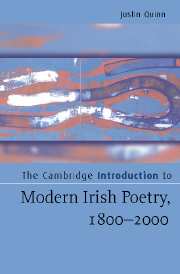Book contents
- Frontmatter
- Contents
- Acknowledgements
- Introduction
- 1 The appearance of Ireland
- 2 Tennyson's Ireland
- 3 Revival
- 4 W. B. Yeats
- 5 Wild earth
- 6 The ends of Modernism: Kinsella and Irish experiment
- 7 Ireland's Empire
- 8 Seamus Heaney
- 9 Irsko po Polsku: poetry and translation
- 10 Feminism and Irish poetry
- 11 Out of Ireland: Muldoon and other émigrés
- 12 The disappearance of Ireland
- Notes
- Guide to further reading
- Index
5 - Wild earth
Published online by Cambridge University Press: 05 June 2012
- Frontmatter
- Contents
- Acknowledgements
- Introduction
- 1 The appearance of Ireland
- 2 Tennyson's Ireland
- 3 Revival
- 4 W. B. Yeats
- 5 Wild earth
- 6 The ends of Modernism: Kinsella and Irish experiment
- 7 Ireland's Empire
- 8 Seamus Heaney
- 9 Irsko po Polsku: poetry and translation
- 10 Feminism and Irish poetry
- 11 Out of Ireland: Muldoon and other émigrés
- 12 The disappearance of Ireland
- Notes
- Guide to further reading
- Index
Summary
The achievements of the Irish Literary Revival were beyond dispute: in the genres of drama and poetry, there now existed works that commanded the attention of the Anglophone world and beyond. These works, in different ways, all attempted to express some national essence, some spirit that could not be found anywhere else on the planet. It would be fair then to assume that the generation of writers that followed would find the going easy, as they could, with confidence, expand the themes and audience that Yeats, Synge and Gregory, among others, had established. Many Irish poets of the generation after Yeats refused to embrace the challenge of Modernism, preferring instead to follow the instructions laid down by their great forebear: ‘Cast your mind on other days / That we in coming days may be / Still the indomitable Irishry.’ Blanaid Salkeld (1880–1959), although she began in an archaic sub-Yeatsian mode with her collection Hello, Eternity! (1933), quickly embraced a kind of hectic futurism in some of the poems of her next book, The Fox's Covert (1933). But she is something of an anomaly, and an unsuccessful one at that. For many poets, the idea of national continuity expressed by Yeats was compelling. It contains an idea of ‘rootedness’ that is at odds with Modernism, a preference for the homespun over homelessness. The world may indeed have been falling apart, but that was all the more reason to assert and maintain the cultural integrity of Ireland.
- Type
- Chapter
- Information
- Publisher: Cambridge University PressPrint publication year: 2008



